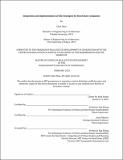| dc.description.abstract | There has not been a time in the history of capitalism that real estate investors and managers care about “doing good” as today. While the sole pursuit of financial return has undoubtedly been the dominant driver for real estate investments, Environmental, Social, and Governance (ESG) considerations currently play an increasingly vital role in decision-making for real estate companies. However, as the regulations and capital markets around ESG are still in their nascent phase, the real estate industry has to rely on diverse sources of information and unverified assumptions to determine what, how, and why they should approach ESG.
This study examines how real estate owners, asset managers and developers approach asset-level and portfolio-level ESG issues through deep-dive interviews with ESG leaders of major market players. Based on the interviews, the paper identified various patterns of methodologies for how those companies 1) integrate ESG into their investment process, 2) define ESG targets and metrics, 3) collect and manage data, 4) prioritize among ESG strategy options, and 5) perceive the impacts of those practices.
Beyond providing a structured overview of the current ESG practices by major US real estate companies, the study also intends to unveil the rationales behind those efforts. By mapping the results across the companies’ attributes, including ownership structure, investment strategy, international exposure, and asset class, it also sheds light on potential explanations for the divergence of their perspectives. | |
